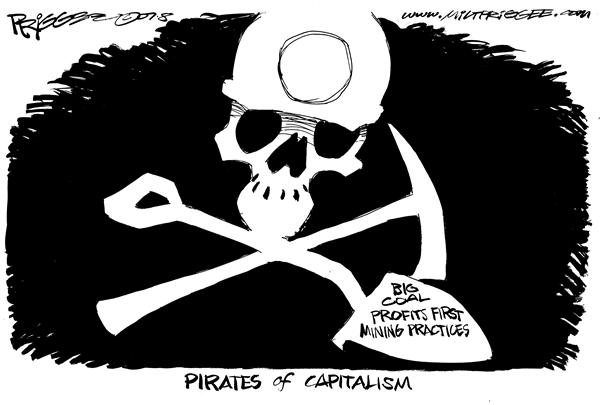Search
Democracy Links
Member's Off-site Blogs
silencing canaries .....

Anti-coal activists pose a political threat. That's why we're being spied on …..
I'd like to know how the government can justify employing a private company to spy on me. As an anti-coal activist, and member of one of three main community groups in Australia campaigning against the coal industry, I was alarmed by revelations in The Saturday Age that the Australian Federal Police has singled us out as a potential threat and is employing a private company to spy on us.
As peaceful community activists, we collectively have no history of or motivation to disrupt energy supply. We pose no threat to society - unlike the coal industry, which wields massive political influence and holds the greatest responsibility for the hundreds of thousands of deaths, extinction of species, and billions of dollars of damage annually that climate change is causing.
So on what basis are we deemed a threat to critical infrastructure and energy security? In Victoria, the only thing anti-coal activists have ever done to affect energy supply was a protest in 2009 that for a few hours shut down one of Hazelwood Power Station's eight coal loaders, temporarily removing 0.5 per cent generation capacity from the national grid on a day of relatively low electricity demand.
Even if we were able to seriously disrupt electricity supply on a high-demand day, I fail to see how triggering blackouts could further our cause. As such, we clearly pose no threat to society and do not warrant being spied on, or having special legislation enacted to curtail our advocacy.
Yet a lack of evidence doesn't seem to have stopped the federal Minister for Resources and Energy, Martin Ferguson, from successfully advocating for heavy-handed laws framed in the language of anti-terrorism, but designed to repress political advocacy.
Indeed, the real threat that anti-coal activists pose is a political one - mass protests at Hazelwood Power Station in 2009 and 2010 helped to withdraw the social licence of this dangerous, polluting industry.
This in turn led to the current federal government legislation to buy out and close 2000 megawatts of brown-coal generation, and no doubt caused political fallout for the coal industry and its political allies. It is unsurprising that the coal industry would flex its political muscle in response, demanding tougher laws to deter such effective advocacy.
The real threat to our energy security in recent times has been the massive use of airconditioners on very hot days, exacerbated by lack of policy to institute more efficient building codes, or to build more solar power to match these demand spikes.
So not only does the coal industry appear to be manipulating our political and legislative processes, it continues to pollute, expand, and cause death and massive damage with impunity. For years, it has successfully curtailed government action to combat climate change. Now the crisis looms: leading scientific experts tell us that the world is on track for 4 degrees of global warming, potentially by as early as 2060, resulting in mass extinction and a reduction of Earth's carrying capacity to less than 1 billion people. As burning coal is the single greatest contributor to the climate crisis, it therefore "poses the single greatest threat to civilisation and life on this planet'' (in the words of Professor James Hansen, NASA's top climatologist).
So given that airconditioning poses a greater threat to energy security than anti-coal activists do, and that burning coal poses an existential threat to life on this planet, perhaps public resources could be better spent on something other than interfering with community advocacy aimed at trying to stop the coal industry from destroying the biosphere.
Shaun Murray is the spokesperson on coal for Friends of the Earth Australia, and an activist with the Quit Coal campaign.
- By John Richardson at 10 Jan 2012 - 9:00am
- John Richardson's blog
- Login or register to post comments
Recent comments
3 hours 16 min ago
4 hours 6 sec ago
4 hours 19 min ago
4 hours 26 min ago
4 hours 37 min ago
6 hours 45 min ago
7 hours 24 min ago
9 hours 36 min ago
11 hours 24 min ago
15 hours 36 min ago